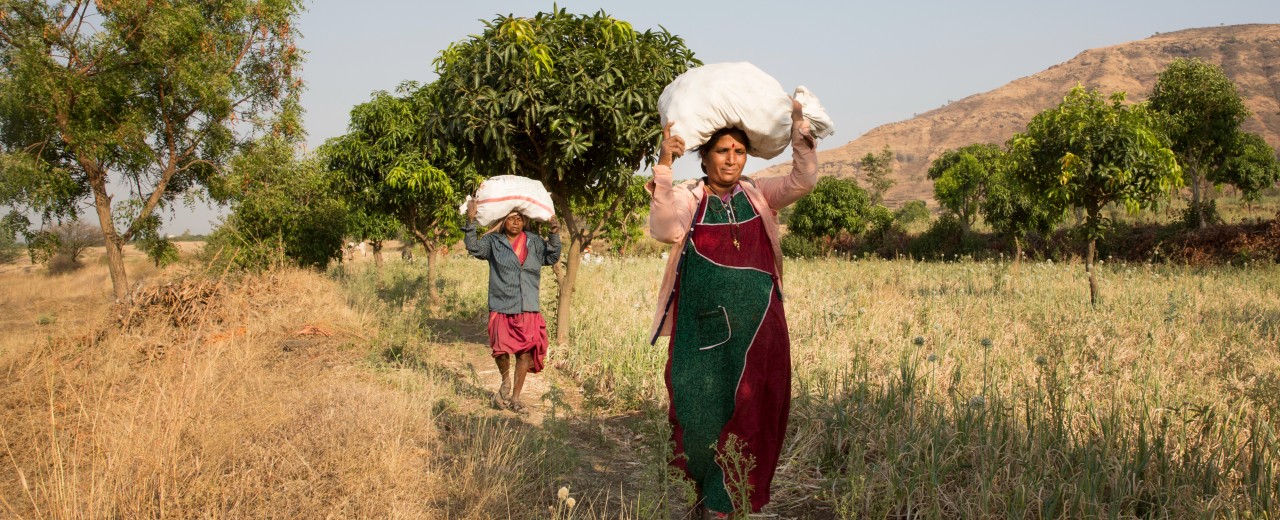News from 2021-10-14 / KfW Development Bank
India: taking care of the soil and protecting the climate with agroecological methods
KfW provides loan for sustainable agriculture by women’s self-help groups

Taking care of the soil, protecting the climate and improving the income of female smallholders – KfW is supporting three goals at once in the state of Andhra Pradesh in southern India. On behalf of the German Federal Government, KfW is providing a loan of EUR 90 million to promote sustainable agriculture. At the same time, the bank is pursuing an innovative, results-based financing approach: the funds are being paid out little by little once the first successes become apparent.
A mix of traditional and modern methods allows the female smallholders in Andhra Pradesh to farm their soil using organic agricultural methods. Instead of chemical fertilisers, they use cow manure, mulch and plant extracts to increase the soil’s fertility and improve its quality. These measures are urgently needed as 60 % of the arable land and 40 % of forests in India are considered degraded. For the female smallholders (women are predominantly responsible for family farming) there is another benefit: they save the expenses for purchasing synthetic fertiliser.
This is particularly important as the costs of chemical fertilisers and pesticides have already caused many families to fall into poverty in the poor rural regions of Andra Pradesh. They are trapped in debt if their incomes do not cover their expenses. Prolonged droughts and flooding caused by climate change are occurring increasingly frequent and exacerbate the situation. The suicide rate in the region is high, as many of the desperate farmers lack any perspective.
An escape from the debt trap
On behalf of the German Federal Ministry for Economic Cooperation and Development (BMZ), KfW is providing a loan of EUR 90 million and a grant of EUR 1 million to support a project spreading sustainable agricultural methods in Andhra Pradesh, stabilising and improving the incomes of women smallholders and improving the quality of degraded soil. Even though organic farming methods will be used, the produce will not be certified ‘organic’ as the associated costs would be too high for the family farms.
Many women in Andhra Pradesh are members of self-help groups to network and share their experiences with others in an effort to engage in social transformation and create healthier living conditions. So the project KfW is promoting does a particularly good job of addressing the well-organised women in these self-help groups. They campaign for natural agricultural methods in their communities.
The soil is becoming more fertile again
Forgoing synthetic fertilisers and pesticides protects the soil life that aerates the soil and improves its quality. The humus content and thus the soil’s water retention ability continue to improve, the yields are stabilising. The project’s agroecological approaches were developed in India and are adapted to the local conditions. This increases both ownership and adaptation to climate change.
Not everyone is immediately convinced by the agroecological approach and natural cultivation methods. Hence, many of the female farmers initially test them in their home gardens. As soon as they see that it is possible to have plentiful harvests despite avoiding chemical fertilisers and pesticides, they use the new methods on larger areas.
An accompanying study is evaluating the successes the female smallholders will have using sustainable cultivation methods. “It’s about demonstrating that this type of farming ensures sufficient yields to create food security,” explains KfW portfolio manager Iris Harder. “Agriculture will ultimately need to nourish a growing global population.”
Disbursement based on success
The KfW loan funds are disbursed in tranches whenever predefined results and their associated predefined indicators are achieved, which is different from other projects that reimburse costs. This type of innovative loan is called results-based lending (RBL).
Around 120,000 families are benefiting from the project, most of them are extremely poor. The project contributes to food security and helps people adapt to climate change. It also strengthens the position of women in the community.
Other Indian states have also shown an interest in the principles of the project.

Share page
To share the content of this page with your network, click on one of the icons below.
Note on data protection: When you share content, your personal data is transferred to the selected network.
Data protection
Alternatively, you can also copy the short link: https://www.kfw-entwicklungsbank.de/s/enzBWrMC.CklA
Copy link Link copied